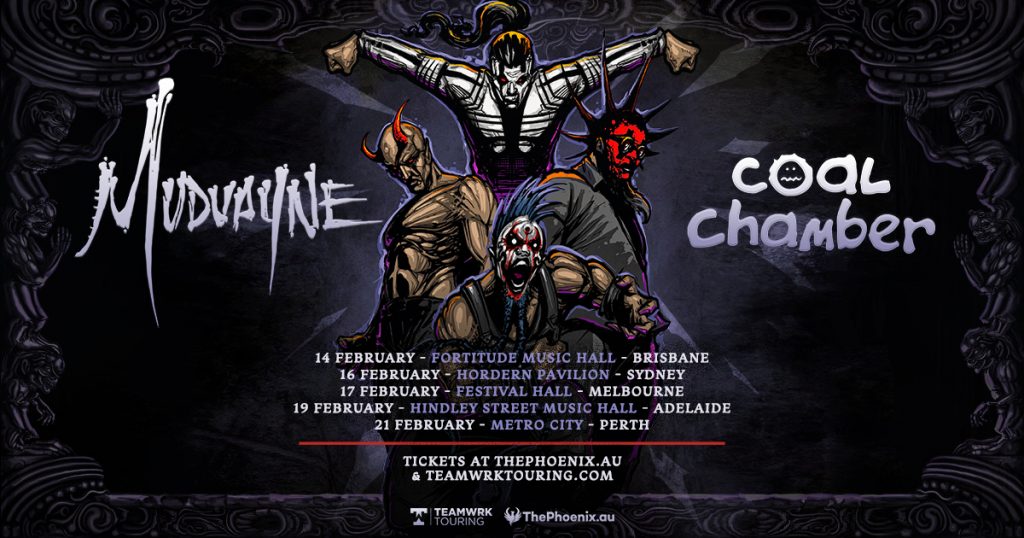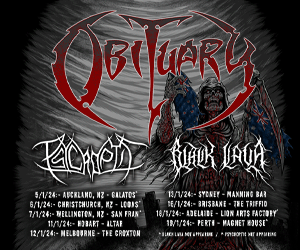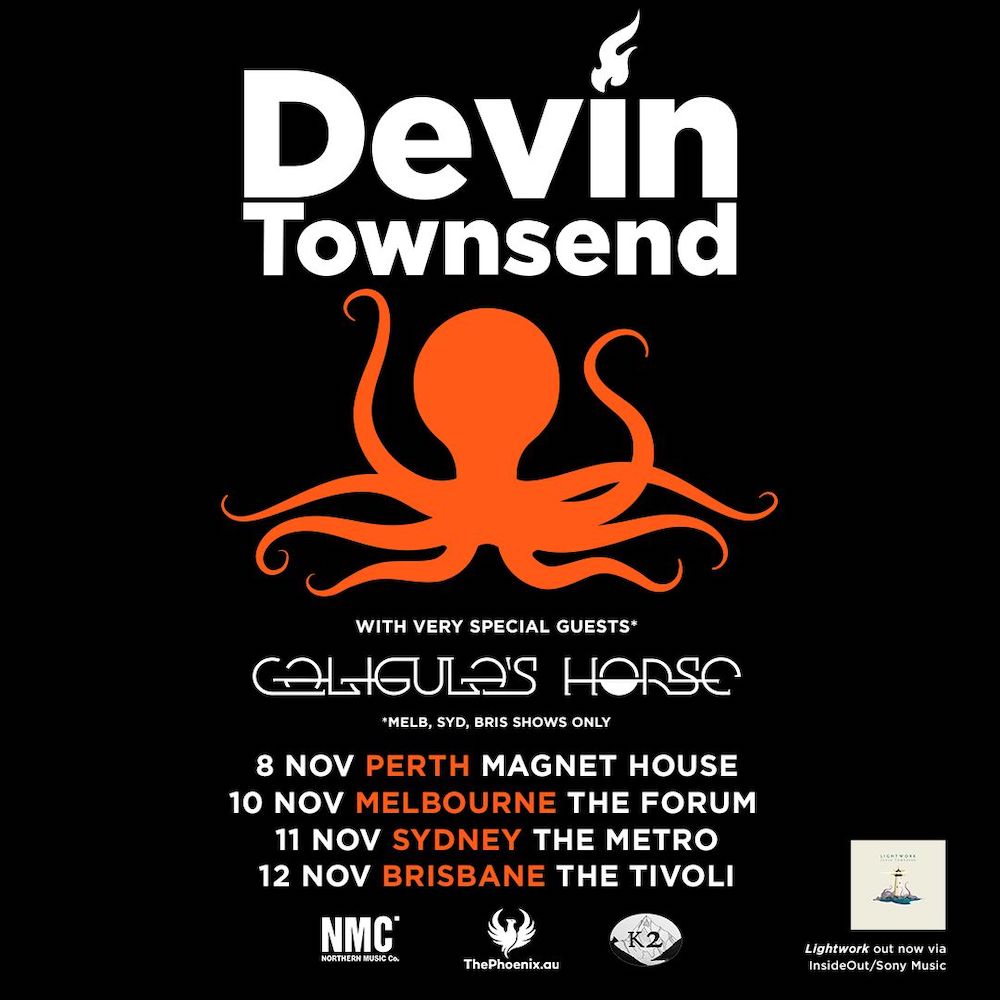Melbourne’s rising femme-punk provocateurs Arabella and the Heist have just dropped their current single Electric, …
Devin Townsend has been one of the most interesting and innovative musical acts of the last thirty years. With a vast oeuvre of work that spans the rock world from extreme metal to ambient electronica, Townsend has never allowed himself to be restricted by form, content or design but there are definitely songs from his collection that are favourites of both himself and his audience. Australia is due to witness the sweeping musical agenda of Devin Townsend this week.
MORE: NOFX: Fat Mike and his Eternal Footwaer Gratitude REVIEWS: POLARIS: Fatalism // THY ART IS MURDER: Godlike // C.O.F.F.I.N // Australia Stops // HYRO THE HERO: Bound For Glory // TEENAGE WRIST: Still Love
“The catalogue I draw from has some stalwarts in it,” he says in his disarmingly friendly way. “There are things that I like to be able to play for people if I haven’t been somewhere for a while. I want to be able to represent some of the new material, and I want to represent some of the songs that I like, too. Between 30 records of material, some of it’s new, some of it’s things from the Infinity, Strapping (Young Lad) days… The thing that the pandemic brought to me, other than a sense of fear, was having the opportunity to be able to continue with this work means you have to keep yourself strong and on top of your game.”
Returning to one of his regular touring locations after a long pause due to the pandemic, Townsend will be here on the back of last year’s expansive Lightwork album with his carefully curated band.
“I’ve assembled a band that can play all of the material, as opposed to being able to focus on a certain degree of it, because it runs the gamut of things like Ghost to Casualties of Cool, to Strapping Young Lad and Deconstruction, and having people that can do all of that has not been easy to find, and sound people who can do that. But I believe that, to the extent that I’ve been able, that’s what I’ve done, and I look forward to coming back there and being able to show that to everyone. I think it’s great.”
H: On previous tours you’ve generally presented one guise or band, so it must have been a particular challenge for you to find people who can do all of it.
DT: They had to learn it too, right? Finding musicians straight out of the gate that are going to be able to run that gamut, [shakes head] I’m sure they’re out there, but I haven’t found them. So my solution to that was finding people who had their feet planted in certain aspects that have been problematic for past players, and then slowly be able to incorporate other parts of the aesthetic that I choose to participate in as a musician, and then keep touring and touring and touring. Training people sounds condescending, but it’s something like that.
H: Touring constantly like that, do you take the opportunity to build the setlist over time to something that is perfect for you, that everyone who is involved is able to create to your standard?
DT: There’s an old adage that perfect is the enemy of the good. I don’t think that with the breadth of material I have, and my enjoyment of a lot of it, that’s a problem in the first place because I don’t have the time for hardly any of it in a normal set. Secondly, it’s all perspective. What my work one night, because of my tendency to write all of these different styles, I’ve got a lot of moods to draw from. Some days, what may be a perfect set one night, the next night I might be, “Oh fuck this, this is annoying!” So i think that the best way to proceed for me is to not focus on it being perfect, but to focus on it being as cool as I can make it. Those are the criteria – things that I know the audience will like, things from the record I’ve been working on recently, and things that I like. Fortunately because of the scenario that I’m in now, I can pull from any area of the career and it would be reasonably authentic
H: There’s such a breadth and diversity of styles to your music that it must really confound and confuse a lot of people each time you do something new.
DT: Everytime I put something out, without fail, people think that’s my direction now. It’s all different. I’ll say until my dying breath: I do what I feel like seems to be the most appropriate direction of where my head is at, at the time I am at. Once I’ve put that out, the chances of the next thing I do being the exact opposite, based on fatigue, because I’m sick of doing that stuff is basically a hundred per cent. So it confuses people, every time. As an occupational hazard, confusing people is not that bad a thing.
There’s an old adage that perfect is the enemy of the good. I don’t think that with the breadth of material I have, and my enjoyment of a lot of it, that’s a problem in the first place because I don’t have the time for hardly any of it in a normal set.
[ Devin Townsend ]
H: Going back to your earlier period and the really intense stuff you were producing at then, there was a time when you decided you were done with that and wanted to move on from there. Did the fans make it a little bit difficult for you then because they had come to expect that level of intensity from your music?
DT: Yeah, and I respect that, because the way that I do the work that I do is not typical. The process that I employ to do it is basically counterpart to my development as a human being, and I’m suspicious of anyone who feels the same way in their 50s as they did when they were in their 20s. That wouldn’t be particularly healthy for any of us, let alone me! Because that’s how I do it, and a band of bands don’t do it (that way), I have full respect for the audience being confused by that. There’s no resentment on my part for that. The other thing I was going to address is, when I was making that super intense music, and by intense I mean Strapping, or whatever, it’s not like I didn’t feel comfortable with making it. I felt 100% comfortable with it. But because it was in service, unwittingly at that point, of personal development, once I had done it, I learnt what I needed to learn from that. To stay there is not an option. It’s absurd. At the time, it was everything to me, but then, when I moved on, I moved on. I do not fault an audience in the slightest for not liking that, or being confused by that. But it’s what I do, right? So it’s what I do!
H: You’ve always been very forthright and honest with your decisions you’ve made artistically. You’ve never hidden behind a mask. You’ve always been very honest with anyone who’s asked about the personal issues you’ve had in the past too. Do you think that’s helped you to connect with your audience a lot more?
DT: Inadvertently, yes! On a practical level, if you always tell the truth about what you’re feeling, you never have to remember anything! If it’s embarrassing in the moment… like if I had a small penis, or whatever, and then somebody said “Hey, you’ve got a small penis!” I’d be like, “Yes, I told you. Do you want me to pretend it’s not, and then live in fear of you finding out that it is?” I think it’s the same thing with your artistic motivation. If you’ve created something that resonates with somebody to the point where it moves them emotionally, of course they want you to be doing that because it makes them feel a certain way. I think that if you’re able to achieve some level of financial stability by doing that, and then covertly try to create things past their due date, the people who are emotionally invested in it at some level are going to know that you’re lying. I think what I find about the music industry – not so much now but back in the 90s – is they always had this credo that the audience is stupid. They’re not going to know. I don’t know about that, man. I don’t know about your audience, but my audience is typically not stupid at all. They’re going to know when I’m full of shit. This may be me, and I could be wrong, but I’d rather somebody changed and they not lie to me, and then me to say, “OK, we’re no longer made for each other,” and that’s it.
H: Lightwork was an incredible album but it took a very long time to sink in. It was an album that seemed to very much in two halves, with the final track bringing everything together in something like a microcosm of almost everything you did throughout the pandemic and even a little before.
DT: Well, thank you, for one. Lightwork was incredibly difficult for me. The process was so… not easy for me. I consciously chose to work with a producer. I’d never worked with a producer before and everyone was always saying, I wonder what would happen if you did, and I was also wondering the same thing. I think that when you’re self-producing – not just me, but in general – you also have the tendency to not self-edit and it’s very easy to vapourise and disappear up your own backside. So I chose to work with a producer but the working situation I found myself in, with Gggath and his team, as brilliant as they were, it was like an immovable object and an unstoppable force. When you have a distinct vision, and somebody else has a distinct vision, by the end of it – which was really cool – I just didn’t relate to it. It’s not that it was wrong. It was really cool and it would have turned out very different if I had allowed him to do what he wanted to do with it.
But because of the pandemic, and because of aging parents and because of loss around me, and all of the things that had happened with The Puzzle which was psychologically intense for me, LIghtwork ended up being an essay, in a sense, on how to deal with conflict, and how to stand up for yourself. How that ended up manifesting, in the end – and this is why it sounds like it has two sides – I finished it on my own. And that made the making of the record really dreadful for all of us involved. I love Gggarth, but at the same time I know they will thing I took my ball and went home, but, I’ve got to tell you man, I needed to do that. Because unless I can listen to the record and be at peace with it, regardless of how good it is, regardless of how many other people like it – if I don’t like it, I’m not going to put it out.
Lightwork was one of the most difficult records I’ve made, and even the title and the idea of the lighthouse on the cover, all the loss and all the stress and all the chaos that was going on at that time – the music became something I could focus on to remain reasonably balanced during that period. So less so than a record, it was more a statement of a couple of things that artistically I had struggled with at that point. I know that’s a super esoteric way to describe a record. It can’t be summarised easily, but again that’s how I perceive the work. Really, the music… none of it matters. It’s the intent, because it acts as a trajectory for the people who have been there and participated in the work. So I have to feel that it makes sense to me, even if it’s not commercially successful. I hope my criteria is enough to keep enough people around to want to participate in it and keep them listening to it. That’s it.
H: You seem to have been able to achieve that so far. Whatever you choose to give us next is sure to be polarising, probably will be confusing, but a lot of people will be into it.
DT: Well I think, the thing is, as well. To the extent that I think that I’m not full of shit – that’s how not full of shit I am! But time will tell! Maybe I’m totally full of shit, but I don’t think I am! [laughs]
H: It’s going to be great to have you here in Australia again. There was a time when you seemed to be here about every six months on different tours.
DT: I remember! I want to say that I hope the trajectory of my work is something that people will see is worth fighting for, as opposed to, “Why aren’t you doing that anymore!” [laughs].







